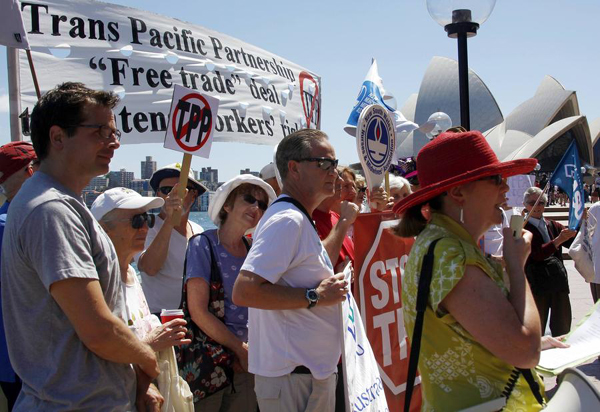TPP faces challenges in US Congress
- By Mitchell Blatt
 0 Comment(s)
0 Comment(s) Print
Print E-mail China.org.cn, June 20, 2015
E-mail China.org.cn, June 20, 2015
From an economic development perspective, free trade deals should be a no-brainer. The increased trade ordinarily boosts economic growth for all countries involved. The hard part is negotiating over the terms, as each country wants policies to protect their perceived self-interests.
|
|
|
Protesters hold banners and signs in front of the Sydney Opera House during a demonstration against the Trans-Pacific Partnership (TPP) trade agreement November 8, 2014. [Photo/China Daily] |
The Trans-Pacific Partnership has been in negotiation for a decade. The deal would link 40 percent of the world's economy, including the United States and Japan, and other developed and developing countries in Asia and the Americas. But now, even after a dozen countries have largely hashed out their differences, it faces perhaps its toughest challenge -- getting through America's Congress.
It would be a shame to throw away all of the hard won progress in negotiations just because American politics is dysfunctional. But the peculiarities of American politics, and particularly the obstructionism of the Senate, make it hard to get even the simplest things done, much less a complex international trade deal.
Of America's two bodies of legislature, the Senate is supposed to be more deliberative. Its rules are written such that minorities can slow down consideration of bills more easily than in the House of Representatives.
A single Senator can filibuster to delay progress and require 60 votes, rather than a simple majority of 51, to pass a bill. Supporters of the filibuster say it is necessary to proceed with caution on major legislation. Yet filibusters are now used routinely to stifle the consideration of routine bills and consideration of executive and judicial nominees. From 2009-2010, 60 proposed actions were blocked by filibusters, compared to two for the entire 1950s. The prevalence of the filibusters led to this headline in 2013: "Universal background checks failed by a vote of 54 to 46." The bill that would have required background checks for private gun sales, in the wake of a mass shooting, won a majority of votes but failed.
If the TPP were to be considered in Senate under normal procedures, it might win a majority but still fail. The initial vote to grant "fast track" trade powers passed with 62 votes in the Senate, two more than needed to avert a filibuster. The Republicans voted in favor of the bill by a 48-5 margin while the Democrats voted against it, 14-30. President Obama supports the trade bill, but Democrats largely oppose it because they think it will empower big business at the expense of low-skilled labor. Now that there are less than two years left in Obama's term, Democrats are not so concerned about heeding his demands; he has entered his lame duck phase.







Go to Forum >>0 Comment(s)